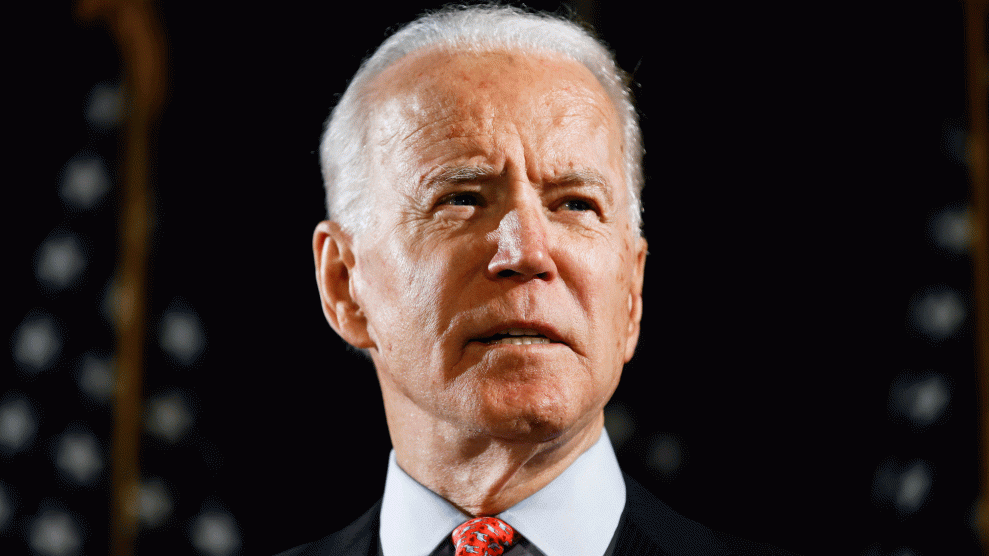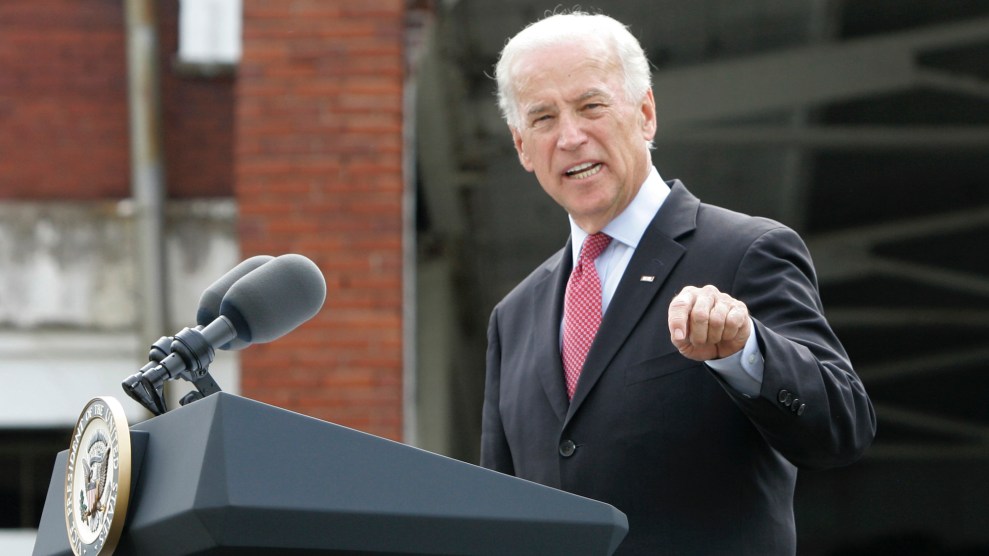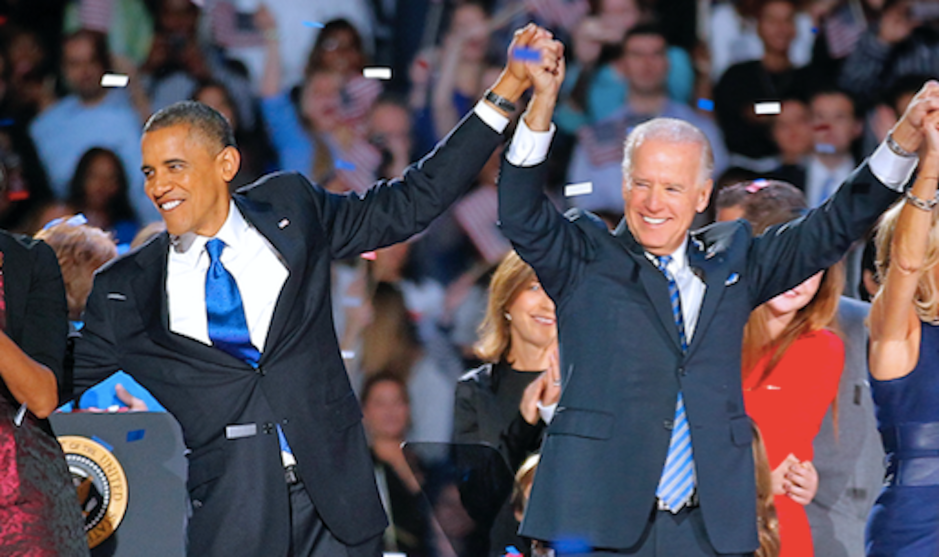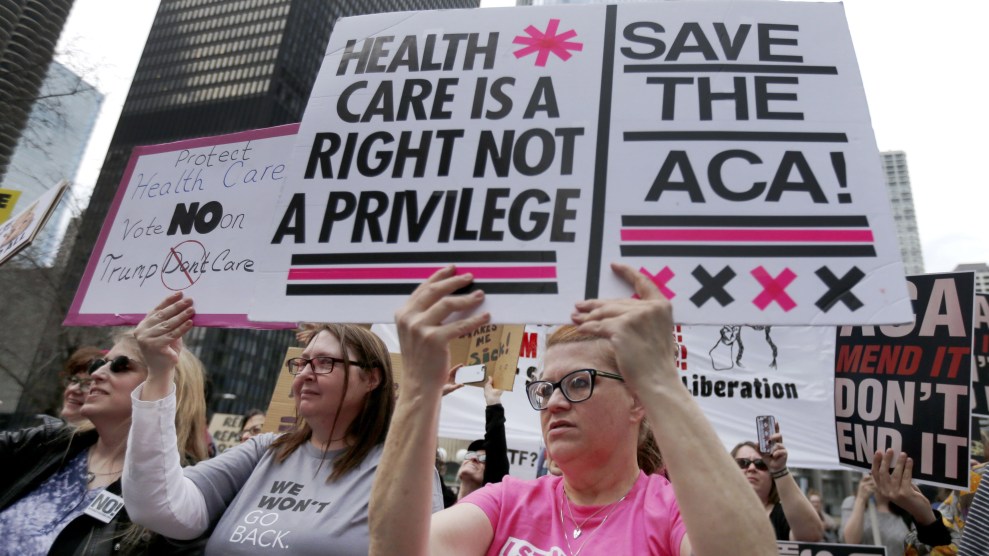
Matt Rourke/AP
When former Vice President Joe Biden announced a year ago he was running for president, he declared, “We are in the battle for the soul of this nation.” Last November, he tweeted, “This election is about the soul of our nation—and Donald Trump is poison to our soul.” His campaigned mounted what it called a “Soul of the Nation” bus tour with a bus ferrying Biden that was emblazoned with the slogan “Battle for the Soul of the Nation.” During the presidential debates, he repeatedly echoed his assertion that “we’re in a battle for the soul of America.” And in the last debate of this year’s Democratic presidential contest—when Biden faced off against only Sen. Bernie Sanders—the former veep remarked, “Four more years of Donald Trump will fundamentally change the nature of who we are as a nation. We’ve got to restore this country’s soul, that’s essential.”
On Thursday, Biden appeared on MSNBC’s Morning Joe show and it wasn’t until near the end of the twenty-minute-long interview that Biden mentioned the S-word, saying, “we need to restore the soul of the nation.” Instead, he focused on the coronavirus crisis and Trump’s inept response to it. Rescuing and preserving the overall and ephemeral nature of the country—whatever that might be—was no longer the key component of Biden’s sales pitch. The pandemic has provided him with the opportunity to shift his message from the abstract to the concrete. And there’s nothing more specific than life and death.
Biden’s “soul of the nation” mantra was an overarching theme that could cover various critiques of Donald Trump: his crude and mean-spirited personal behavior, his policies that benefitted the wealthy and screwed middle- and low-income Americans, his brazen trampling of democratic and good-government norms, his demagogic and divisive actions, his embrace of murderous autocrats. Anything a voter might not like about Trump could be placed in the “soul” bucket. This notion also seemed designed to place Biden in a lofty position and to be an appeal to the better nature ofAmerican voters. Sure, Biden has policy positions he would seek to implement should he be elected president—ideas that his foes and critics could pick at—but the former veep was trying to signal he was pursuing something grander than all that. He was contending that the greatest threat of Trumpism was its corrupting influence on the values of the nation—and that he could cleanse the country.
It’s unclear how such a high-falutin’ but amorphous argument would fare against a man who delights in throwing shitballs at opponents and in the no-rules exercising of gutter politics. And would voters struggling with the front-line issues of income, health insurance, education, and social justice be turned on by talk of the inner being of America? Would those voters who craved a red-meat challenge to Trump or a stronger critique of the status quo be motivated by a call to win this high-minded battle? Biden’s vow to make America soulful again did work well enough to vanquish Sanders and his other opponents in the Democratic primary. But eight more months of this—coming while Biden’s was being attacked relentlessly by the massively financed Trump campaign Death Star? Well, who knows how that would have played out?
But things change.
The coronavirus crisis quickly eclipsed Biden’s concern about the country’s intangible quintessence. Thousands of Americans dying each day, health care workers facing war-like conditions, the economy in a free-fall, with millions losing their jobs, schools closed, much of the population shut in—what matters most now for the 2020 campaign is how Trump, as president, defended the nation from the invasion of a submicroscopic infectious agent. An election involving any first-term president is usually a referendum on the commander in chief. But this time, it has become a referendum on a well-defined aspect of Trump’s chaotic and abnormal presidency: how he has performed during a historic crisis. “People are clearly seeing the contrast between President Donald Trump and Vice President Joe Biden,” says a senior Biden adviser, “and we obviously had nothing to do in setting that up.”
This adviser insists that it has generally been Biden’s preference not to attack Trump directly, “but Trump walks into this every day.” Trump demonstrates little, if any, empathy for those killed by COVID-19 and their relatives; Biden is a poster child for empathy. Trump delayed in taking widespread action to thwart the spread of the coronavirus; Biden called for decisive steps early on. Trump has dismissed or ignored science; Biden has vowed to be guided by data-based expertise. More over, as Trump has been flailing as a leader in this crisis, Biden, as vice president, helped to manage the successful stimulus and auto industry bailout that boosted the economy after the 2008 crash.
On Morning Joe, Biden spoke from the heart about the loss being experienced by families across the United States and the fear being felt by millions. “You got to let them know you understand their pain,” he said. “The worst thing in the world is being—going through this in isolation and thinking nobody hears me.” He noted it was absurd to talk about getting people fully back to work without a more extensive testing regimen. With a sad tone in his voice, he remarked, “So the president, instead of saying, here’s my plan, this is what we’re going to do, this is how we’re going to get you tested, this is how we’re going to this… He doesn’t take responsibility. And he says the most bizarre things.” Biden pointed out that had he been in the Oval Office at the start of the pandemic, he would have invoked the Defense Production Act to force GM and other American companies to manufacture necessary equipment, designated a general or admiral to oversee the entire supply chain, established a “pandemic testing board,” and opened up enrollment for Obamacare. It was indeed a contrast to Trump’s record.
In other circumstances, it might be difficult or awkward for a presidential candidate to assail an incumbent who was handling a crisis threatening the nation. “You don’t want to undercut a leader at a time like this,” the Biden adviser notes. “But Trump has not been a leader. So what can we do? You have to call him out. Not just to do it but because we need leadership now. There is, however, a balance between sniping at Trump and talking about how to do this better. The hardest part is being strategic in how we do that.”
But the adviser acknowledges that the strategic thrust of the Biden campaign has shifted from pushing the soul-of-the-nation theme to highlighting the “nature of leadership.” Voters, this adviser says, “want to know who can get things done, how to get out of this crisis.”
It may sound crass, but the crisis at hand—though it presents obstacles to traditional political campaigning—has made the election easier for Biden. This horror has solidified the nation’s priorities and placed a premium on competent, rational, and expertise-driven leadership. Every day, Trump can easily be judged on this front. He faces a daily referendum—in public opinion now, in votes later.
Samuel Johnson, the 18th century English writer, once quipped, “When a man knows he is to be hanged in a fortnight, it concentrates his mind wonderfully.” The coronavirus pandemic has brought the national mind to focus intensely on Trump’s response to a horrific threat. This clarifies Biden’s mission. He merely needs to present a compelling comparison on this point. With Trump continuing to handle the crisis erratically, narcissistically, and incompetently, Biden can now fixate on only winning the nation’s mind. Then perhaps the soul will follow.














